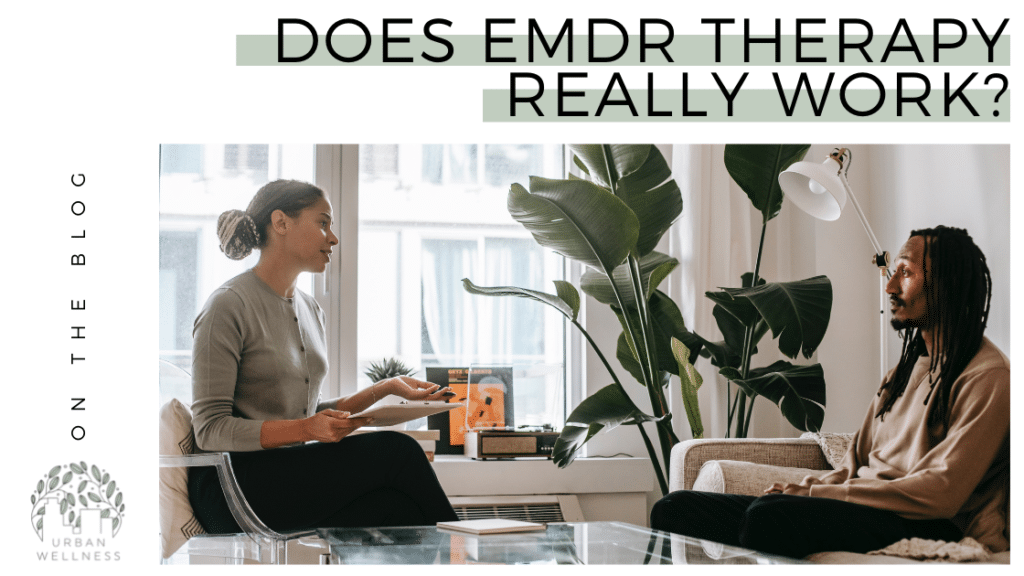Do you ever feel like your past controls you? Many folks live with memories of the past from time to time, but sometimes it’s not comforting to be thrown back into a memory. For people who have experienced trauma, it can be terrifying to find yourself caught up in old memories. That’s where EMDR can come in.
EMDR, or Eye Movement Desensitization and Reprocessing, is a treatment method that helps people reprocess events that they find traumatic or disturbing. EMDR is based on the idea that trauma lives in the body, but can get stuck when we don’t process it correctly.
Trauma is very hard to process – it’s disturbing and distressing, and it makes sense that it gets stuck because we don’t know how to deal with it. Part of being stuck is experiencing a stress response – the fight, flight, or freeze response. It can feel like you’re frozen back in time when you get stuck in a traumatic memory.
EMDR is a way to get trauma unstuck. It allows us to revisit disturbing memories and, using bilateral stimulation, reprocess them so they’re no longer painful or distressing. Bilateral stimulation during EMDR involves eye movements, hand tapping, or audio stimulation. This engages both sides of the brain, allowing reprocessing and healing to take place.
How does trauma affect the brain?
Trauma affects the brain in a number of ways. When we’re traumatized, we have a harder time regulating fear, recalling memories, and managing our emotions.
During a traumatic experience, it can feel like part of our brain is offline – the part for rational thought goes out the window when you’re in a traumatic situation. When part of your brain is offline, it’s harder for your brain to effectively process what’s going on. That’s why trauma gets stuck – it’s not categorized and coded by the brain, it just sits there until things are back online. However, even when we’re back online, it can be hard to figure out how to work through the trauma that is stuck. By engaging both sides of the brain, you help guide your mind to reprocess and recategorize the stuck memories.
The distress that comes from living with trauma can be debilitating. You might feel like you’re stuck and you can’t move forward in life. You might experience PTSD, anxiety, low self-esteem, or depression. It’s not uncommon to feel unmotivated, hopeless, and stuck in the wake of trauma. Treatments like EMDR can help you work through the fears, emotions, and root causes of trauma so you can feel confident moving forward in your life instead of staying stuck.
Why does EMDR sound too good to be true?
EMDR can sound like it’s too good to be true. It’s a fairly straightforward treatment, as far as healthcare goes – just tap or move your eyes and talk? Even though it sounds kind of weird, it is based in brain science. Both sides of the brain need to work together to correctly process and store memories so they don’t get stuck. Tapping or moving your eyes is what engages both sides of your brain for EMDR.
EMDR is also a particularly helpful therapy to trauma survivors because you don’t need to tell your therapist every detail of what’s going on in your memories. You don’t have to find a way to articulate all of the confusing emotions and re-live your trauma for someone else. With EMDR, you will be working to reprocess those traumatic memories so that they’re no longer emotionally disturbing to you.
Does EMDR even work? How does it work?
Researchers don’t know exactly how EMDR works, it’s true. There are scientists who are studying EMDR to learn exactly how it works physiologically. What they do know is that it does work. There is a huge amount of evidence from scientists that EMDR is a radically effective therapy modality. EMDR is recognized as an evidence-based treatment for trauma and PTSD by many organizations, including the American Psychiatric Association, World Health Organization, and the Department of Defense.
What are the benefits of EMDR?
One of the biggest benefits of EMDR therapy is that it works, and it works quickly. With traditional talk therapy, you could spend years talking to a therapist and still find that your disturbing memories are causing you distress. With EMDR, the process is much quicker. Many people find relief in just a few sessions, as opposed to months or years of talk therapy.
During the process of EMDR, you will learn techniques and coping skills to help in the moment when you’re feeling distressed. Everyone will experience distress from time to time, so it’s crucial to have coping strategies ready to go when you need them. EMDR will teach you how to use strategies that work for you and your situation specifically.
EMDR is a versatile treatment that doesn’t just work on trauma – it can be used for anxiety, panic disorder, grief, eating disorders, dissociative disorders, personality disorders, and more.





0 Comments